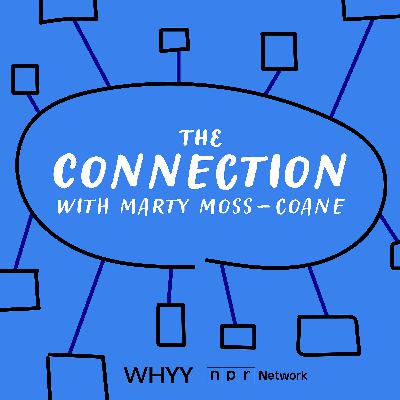Discover The Connection with Marty Moss-Coane
The Connection with Marty Moss-Coane

The Connection with Marty Moss-Coane
Author: WHYY
Subscribed: 75Played: 1,752Subscribe
Share
Description
It’s easy to feel as if the world is falling apart. The Connection with Marty Moss-Coane features wide-ranging conversations about the bonds that hold us together, the forces that drive us apart, the conflicts that keep us from exploring life’s possibilities and the qualities that make us unique and human.
146 Episodes
Reverse
Diana Nyad reflects on her historic swim from Cuba to Florida, lessons of forgiveness, and the challenges and pleasures of aging.
Psychologist Robert Coplan on the restorative power of being alone.
The Weekend Edition Saturday host talks about the state of journalism, covering war-torn regions, an awkward interview with Billy Cosby and a hilarious one with Dame Edna.
Anthropologist Roy Richard Grinker on the progress in understanding autism, the ongoing efforts to overcome mental health stigma, and the need to dispel persistent myths.
Psychologist Jean Twenge -- a mother of three -- gives parents the tools they need to help their kids develop a healthier relationship with social media.
A conversation with Columbia University linguist and author John McWhorter on the power of language, the dangers of censorship, and the evolution of slang and swearing.
Clinical psychologist Ingrid Clayton used fawning as a coping strategy growing up in a scary home. It helped her in those frightening moments but came at a terrible price.
Why don’t we always prioritize what matters most—like making time for family and friends or fitting in a workout during a busy day? Emily Falk believes that understanding how our brain works can help us make better, more intentional choices.
Falk is a professor of communication, psychology, and marketing at the University of Pennsylvania, where she directs the Communication Neuroscience Lab. Her new book, What We Value: The Neuroscience of Choice and Change, explores how different regions of the brain shape the big and small decisions we make every day.
NYU sociologist Eric Klinenberg reflects on lessons learned and not learned from the COVID pandemic and the ways it changed our lives, culture and politics.
Princeton professor Elizabeth Margulis explains why music has the power to affect our emotions, transport us to far away places and connect us to others.
Psychedelic drugs have gained some attention in recent years and neuroscientists are doing fascinating work. Some research includes octopuses on MDMA. We'll get the latest.
Philosopher Stephen Cave on our struggles with our mortality, and how knowing we will die one day can make life precious and even more meaningful.
Are you feeling hopeless about the warming planet? In her book "Human Nature," climate scientist Kate Marvel says it’s natural to feel scared but there’s also reasons to hope.
In her new book “Spellbound,” historian Molly Worthen explains how charisma is more about storytelling than charm.
Poet Edward Hirsch on his complicated and colorful Jewish Midwestern family and childhood where comedy was a competitive sport.
Ethan Mollick’s guidelines of using AI: “always invite AI to the table, be the human in the loop, treat AI like a person and assume this is the worst AI you will ever use.”
Gisele Barreto Fetterman on her childhood as an undocumented immigrant, her life now in the public eye, and why vulnerability is a source of strength.
Author Oliver Burkeman on why it’s time to settle for your imperfections and ditch the relentless self-help messaging of productivity and control.
Psychologist John Kounios on our creative brain and those “eureka moments.” Plus, how composer Jennifer Higdon channels her creativity into her music.
Is caregiving a public or private responsibility?





